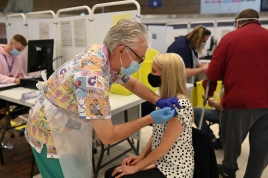We knew Covid-19 vaccines worked. Now we know more.
Friday, April 23, 2021
Studies have shown that several vaccines are highly effective in preventing people getting seriously ill from Covid-19. Now, early results from a survey in the UK show two commonly used vaccines also significantly reduce the number of people getting infected in the first place.
A single shot of the Pfizer-BioNTech and AstraZeneca vaccines reduces Covid-19 infections by 65%, while two doses cut out 70% of infections, according to the Covid-19 Infection Survey, coordinated by the University of Oxford, the UK Office of National Statistics and the Department for Health and Social Care.
The numbers are particularly promising for the prevention of symptomatic infections. Some 74% were reduced with just one shot, and 90% with two. And vaccination was just as effective in people in the vulnerable over-75 age group as it was in younger people.
Two studies highlighting the results were published Friday as pre-prints and have not been peer-reviewed. They analyzed 1.6 million test results from nose and throat swabs taken from more than 373,000 people between December and the start of April.
“These real-world findings are extremely promising and show our historic vaccination program is having a significant impact across the UK by reducing infections among people of all ages, including those with underlying health conditions,” said James Bethell, a UK health minister.
But experts advise people to continue with Covid-19 prevention measures, as some infections will still be transmitted -- particularly when large numbers of the population have had just one dose in a two-dose regimen or haven’t been vaccinated at all.
Sarah Walker, Chief Investigator and Academic Lead for the Covid-19 Infection Survey from the University of Oxford, said that because vaccines weren’t 100% effective, they wouldn’t reduce infections to zero -- but they could get numbers to a level where they are controllable.
“There is a difference between an acute crisis and an ongoing underlying chronic problem – in infectious diseases, we talk about a disease becoming endemic, meaning it is always there and you just have to deal with it, like malaria in sub-Saharan Africa," Walker told CNN.
"The benefits our data show in the general population mean that the vaccines gives us the chance to control the virus more and move into a situation where Covid-19 is an endemic disease – it is an opportunity, but we can still squander it,” she said.
“Every infection provides the opportunity for the virus to mutate into a new variant that the vaccines are less effective against, so it is on a knife edge," Walker said, adding: "We need as many people to get vaccinated and reduce the virus levels to as low as possible.”
https://www.cnn.com/world/live-news/coronavirus-pandemic-vaccine-updates-04-23-21/h_677d0a0cffc6f0ecac7d10f7aa0b9d90





